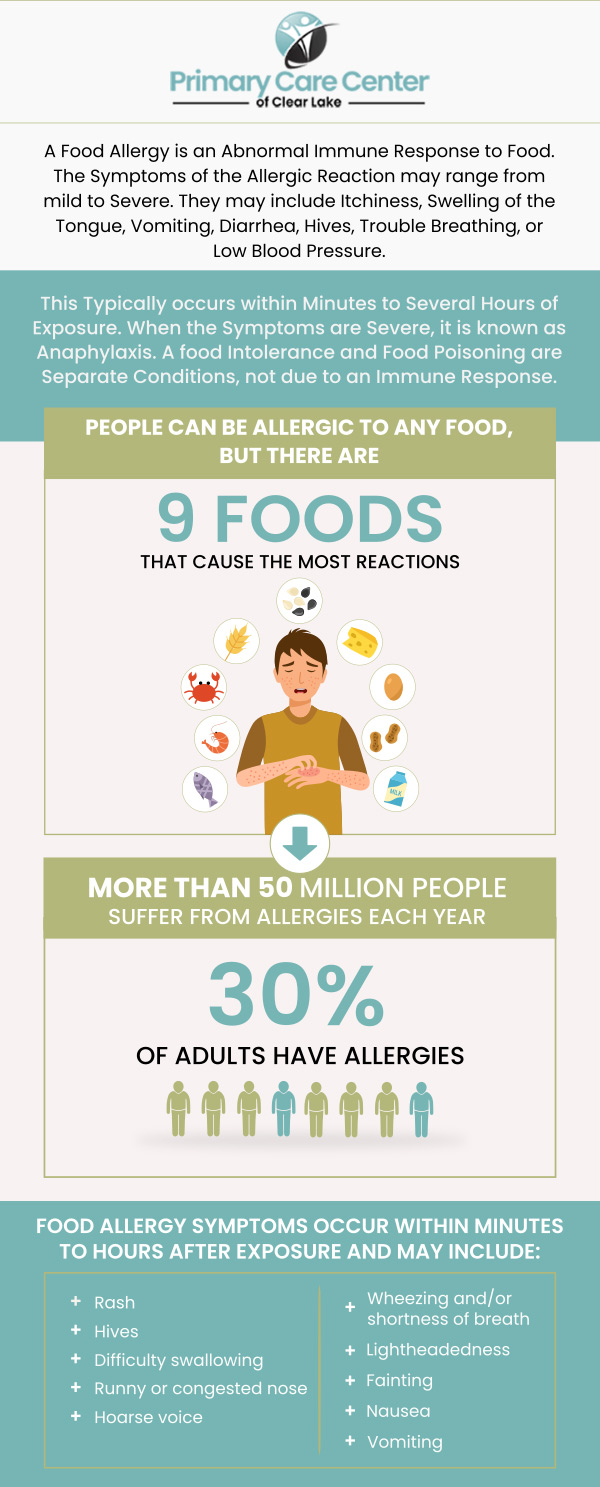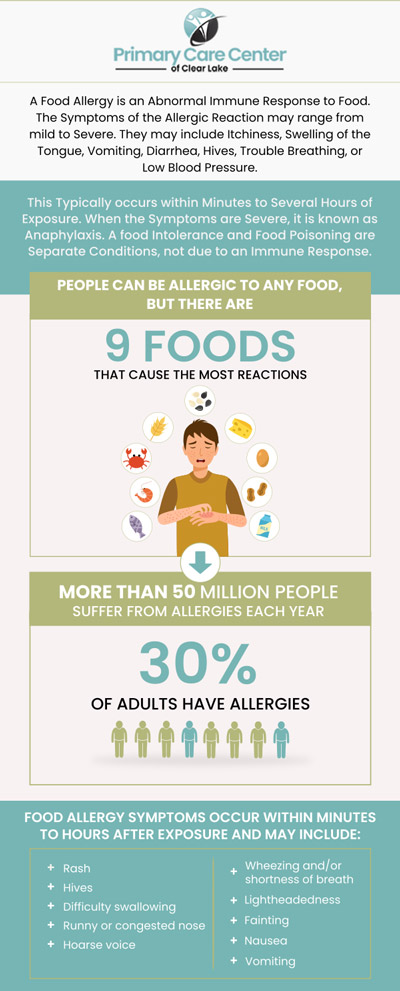Food Allergy Testing Clinic in Webster, TX
Food allergy testing is a vital tool for identifying specific foods that may trigger allergic reactions. At Primary Care Center of Clear Lake, Dr. Smriti Choudhary, M.D., and Dr. Niraj Choudhary, M.D use methods such as skin prick tests or blood tests to determine the allergens responsible for symptoms like hives, swelling, and digestive issues. Accurate testing enables individuals to avoid these potential allergens and effectively manage their symptoms. Food allergy testing is available today! Don’t wait; book your next appointment. Contact our team of healthcare professionals or visit us online to book an appointment. We have convenient locations to serve you in Webster and Pasadena, TX.




Table of Contents:
What are the most common food intolerances?
What happens if you keep eating foods you’re intolerant of?
What are the different ways to test for food allergies?
Those with food intolerances have difficulty digesting certain foods and experience gastrointestinal disturbances after eating them. In food intolerances, certain ingredients cannot be digested by the digestive system. Food intolerance symptoms usually affect the digestive system and are rarely dangerous.
In food allergies, the immune system reacts to foods that it perceives as harmful. The symptoms of food allergies can vary from mild to extremely severe, unlike the symptoms of food intolerance. Anaphylactic shock, a potentially life-threatening condition caused by food allergies, can also occur.
The three most common food intolerances are:
In lactose intolerance, lactose, the main carbohydrate in dairy products, is not digested. At least two-thirds of the world’s adult population is affected by it. The condition occurs if your body does not produce enough lactase, the enzyme that digests lactose. Digestion problems can negatively impact the quality of life of people with lactose intolerance when they consume dairy products. Bloating, diarrhea, and abdominal cramps are some of these symptoms.
Milk and other dairy products contain casein, a protein. The body mistakenly identifies casein as a threat when you have a casein allergy. Attempting to fight it off, your body triggers a reaction. This is not the same as lactose intolerance, which occurs when your body doesn’t produce enough lactase. A casein intolerance can cause stomach aches, bloating, stomach cramps, flatulence, constipation, and diarrhea. It may also cause rashes, hives, eczema, joint pain, and fatigue.
Gluten intolerance occurs when you get sick after eating gluten. Wheat, barley, rye, and other grains contain gluten, which is a protein. You can find it in many common foods and drinks, such as pasta, cereal, and beer. Supplements, cosmetics, and even some medications can contain gluten. Symptoms such as bloating, gassiness, and fatigue may occur. Gluten intolerance is also commonly known as non-celiac gluten sensitivity. The condition is not the same as celiac disease or a wheat allergy. Gluten intolerance affects about 6% of the U.S. population.
Intolerances differ from allergies in that they are less severe and usually result in fairly manageable symptoms that cause discomfort. Many allergies can pose life-threatening risks.
Limiting or eliminating problem foods may require you to change your diet. However, it is common for people with food intolerances to experience few or no symptoms after consuming small amounts of food. An over-the-counter medicine like an antacid or an antidiarrheal can relieve symptoms.
If you keep eating foods you are intolerant to, the symptoms may be similar to food allergies, but anaphylaxis cannot occur. Eventually, however, this reaction can damage the lining of your small intestine and prevent you from absorbing nutrients.
Initially, your allergist may perform a physical exam and ask about your symptoms. The following tests will be performed after that:
Your allergist will administer small amounts of the suspected food to you or your child during an oral challenge test. Injections or capsules may be used to administer the food. A close eye will be kept on you to make sure there are no allergic reactions. If a reaction occurs, your allergist will provide immediate treatment.
An elimination diet is used to determine which specific food or foods are causing an allergy. The first step is to eliminate all suspected foods from your child’s or your diet. Adding the foods back to the diet one at a time will help you determine if there is an allergic reaction. There is no way to determine whether a reaction is caused by a food allergy or a food sensitivity with an elimination diet. A severe allergic reaction should not be treated with an elimination diet.
A skin prick test involves applying a small amount of the suspected food to the skin of your forearm or back. A needle will be used to prick the skin to allow a tiny amount of food to enter the body. An itchy, red bump at the injection site usually indicates a food allergy.
IgE antibodies are detected in the blood through a blood test. When exposed to an allergy-causing substance, the immune system produces IgE antibodies. A small needle is used to take a blood sample from a vein in your arm during a blood test. In a test tube or vial, blood is collected after the needle is inserted. As the needle goes in or out, you may feel a little sting. It usually takes less than five minutes to complete this process.
Primary Care Center and our team of professionals are here to help treat food allergies, so contact us today or book your appointment online. We are conveniently located at 13920 Osprey Ct, Suite C, Webster, TX 77598. We serve patients from Webster TX, Bacliff TX, Dickinson TX, Seabrook TX, League City TX, Clear Lake City TX, and surrounding areas.
Check Out Our 5 Star Reviews


Additional Services We Offer
• 2D ECHO
• ABI Testing
• Obesity Medicine
• Alzheimer’s Disease
• Anxiety Disorder
• Aortic Aneurysm Screening
• Arthritis
• Asthma
• Body Composition Testing
• Cancer Screening
• Carotid Doppler
• Chronic Condition Management
• Chronic Kidney Disease
• Chronic Obstructive Pulmonary Disease
• Congestive Heart Failure
• COPD & Asthma
• Coronary Heart Disease
• COVID-19 Testing
• Dementia Screening
• Depression
• Diabetes Management
• EKG
• Food Allergies
• Food Sensitivity
• Geriatric Care
• Hypertension
• Outdoor Allergies
• Parkinson’s Disease
• Primary Care
• Resting Metabolic Rate Testing
• Thyroid Scan
• Wellness Exams for Men
• Wellness Exams for Women
• Ozempic
• Integrative Medical Weight Loss
• Men’s Health
• Testosterone Replacement Therapy
• Erectile Dysfunction
• Testosterone Gel and Injections
• Women’s Health
• Menopause
• PCOS
• Hormone Replacement Therapy
• Individual Nutritional and Lifestyle Counselling
• Indoor Allergies
• Internal Medicine
• Lipid Disorders
• Medical Weight-Loss
• Osteoporosis

Additional Services We Offer
• 2D ECHO
• ABI Testing
• Obesity Medicine
• Alzheimer’s Disease
• Anxiety Disorder
• Aortic Aneurysm Screening
• Arthritis
• Asthma
• Body Composition Testing
• Cancer Screening
• Carotid Doppler
• Chronic Condition Management
• Chronic Kidney Disease
• Chronic Obstructive Pulmonary Disease
• Congestive Heart Failure
• COPD & Asthma
• Coronary Heart Disease
• COVID-19 Testing
• Dementia Screening
• Depression
• Diabetes Management
• EKG
• Food Allergies
• Food Sensitivity
• Geriatric Care
• Hypertension
• Outdoor Allergies
• Parkinson’s Disease
• Primary Care
• Resting Metabolic Rate Testing
• Thyroid Scan
• Wellness Exams for Men
• Wellness Exams for Women
• Ozempic
• Integrative Medical Weight Loss
• Men’s Health
• Testosterone Replacement Therapy
• Erectile Dysfunction
• Testosterone Gel and Injections
• Women’s Health
• Menopause
• PCOS
• Hormone Replacement Therapy
• Individual Nutritional and Lifestyle Counselling
• Indoor Allergies
• Internal Medicine
• Lipid Disorders
• Medical Weight-Loss
• Osteoporosis





